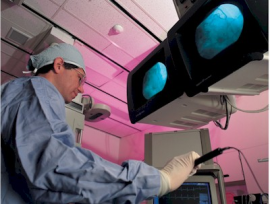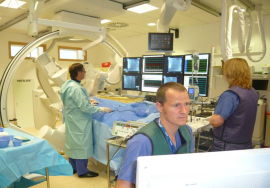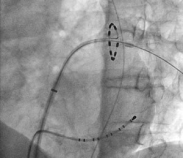Invasive Treatment
Many heart rhythm problems can be diagnosed and treated from a Consultation with simple tests if required. However, in some cases invasive investigation and treatment is beneficial.
Electrophysiology Study
This is a diagnostic test which involves passing wires from the groin to the heart under X-ray control. It can be regarded as an internal ECG, with the additional benefit that we can stimulate the heart with small electrical pulses to examine the electrical system of the heart. It may be that we can trigger previously undocumented palpitations and make an accurate diagnosis. In other cases it may be appropriate to test the heart for any dangerous rhythms.
This may all sound very alarming but the test is without serious risk and will only be suggested if it is likely to give us useful information about your condition. Sedation can usually be given for the test which rarely takes more than 30 minutes and can be done as a day case.
Catheter Ablation
The development of ablation has revolutionised arrhythmia treatment over the last 20 years. In most cases of supraventricular tachycardia including Wolff-Parkinson-White syndrome, the abnormal electrical connection in the heart can be indentified and blocked either by burning or freezing the tissues. This effect is usually permanent and is one of the true cures (as opposed to palliation) provided by modern treatment in cardiology.
Ablation can also be carried out for atrial flutter, where a line is drawn in the right atrium to block the flutter circuit. In recent years we have also learnt how to carry out ablation in atrial fibrillation.
In paroxysmal AF, 70-80% success rates are achieved with pulmonary vein isolation. A major discovery in the 1990s was that the triggers for atrial fibrillation are not randomly scattered through the atria as might be expected, but are mainly localised to the pulmonary veins. Various techniques have been developed to achieve this: currently I use the Ablation Frontiers system, which has been shown to achieve success rates of >80% in paroxysmal AF cases.
In persistent or chronic cases, the CARTO system is available. Lower success rates can be expected for these cases, but ablation is worth considering if present for <2 years or so. I can put you in touch will colleagues who specialise in the persistent and chronic cases if you wish to consider this difficult form of treatment.




